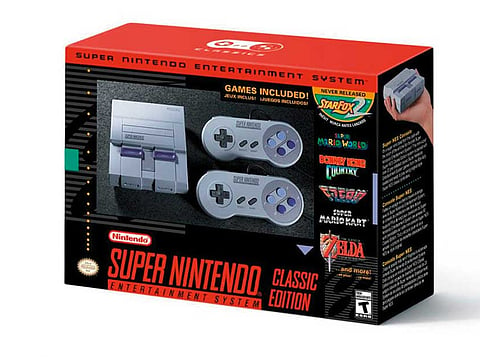Nintendo’s latest blast from the past: SNES classic console
Hit console that debuted in 1990, as a smaller device

TOKYO
Nintendo Co. is discovering that nothing sells like nostalgia.
The Japanese gaming company is bringing back the Super Nintendo Entertainment System, the hit console that debuted in 1990, as a smaller device with 21 pre-installed classic games and two controllers. The retro SNES follows on the heels of the success of last year’s hit revival of Nintendo’s classic first-generation machine.
While Nintendo has always been a shrewd marketer of long-running gaming characters such as Mario and Zelda, the classic consoles are more of a direct appeal to people’s childhood memories. Along with a line-up of smartphone games, theme parks and games for the new Switch console, the retro initiative is part of a wider push by the Kyoto-based company to capitalise on the success of products from the past.
“What they’re doing is trying to create a lot of buzz for their games and generate nostalgia,” said Atul Goyal, an analyst at Jefferies Group. “That nostalgia is very important to create success for the Switch, so it’s all tied together.”
The announcement of the SNES classic edition this week quickly became a top-trending topic on Twitter, and online forums were abuzz with the news.
The retro machine, which looks like a miniature version of the original console, will hit shelves in the US and Europe on Sept. 29, followed by Australia, Japan and other regions, and will retail for about $80. As an added bonus, the device will include a never-released sequel to the original space-fighting game Star Fox.
Judging from the success of last year’s re-release of Nintendo’s first NES/Famicom console, the SNES could sell out quickly. The classic machine became one of the most sought-after products during the 2016 holiday shopping season, with demand outstripping the 1.5 million consoles shipped in the last two months of the year. Nintendo said classic SNES production will be higher, without giving specific figures.
This shows the value of Nintendo’s intellectual property is in the same league as Walt Disney Co., according to Goyal. Nintendo announced a strategy in 2014 to maximise income from Mario, Donkey Kong and other characters. Since then, Nintendo’s characters have adorned Mercedes-Benz cars, Uniqlo T-shirts, and will be a key part of Universal Studios theme parks being built in Osaka and Orlando, Florida.
Kansai International Airport recently opened an area where travellers can play Nintendo games while waiting for flights. Nintendo has also pushed to protect unauthorised use, suinga go-kart operator in February that let customers dressed up as Super Mario, Luigi and other video-game characters drive around Tokyo.
“This is just the very beginning of their IP strategy unfolding,” Goyal said.



